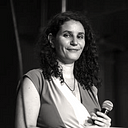Iraq: Action in Kurdistan and Nineveh for IPDs
In Iraq, WAHA International is committed to helping displaced people, chased away from their home by the 2014 violence linked to the rise of the Islamic State in Iraq and Syria. In different locations, WAHA has helped to reopen hospitals, to secure maternal and reproductive care, and to send high-quality medical personnel in IDP camps.

By Melissa Chemam
Dr Juman is a busy woman. Only a few years ago, this elegant gynaecologist was living with her husband in Arizona, in the U.S., but she decided to come back to her home country. The urge to feel helpful and to contribute to the needs of her fellow citizens, plagued again by the attacks from the Islamic State, was stronger than her crave for freedom and peace. For a while at least.
Born in Zakho, in the extreme north of the country, in Kurdistan, Juman is the oldest of a Chaldaean family of seven children. Though her parents were teachers and most of her siblings followed their path, Juman studied medicine at the University of Mosul, started working as a gynaecologist in 1997 and got married in Iraq. Since 2000, she has been practicing her specialty in remote villages, trying to help women with no access to hospitals. For two years, she was the only doctor responsible for Obstetrics & Gynaecology (OBGY) in Amedia.
But with the war starting in 2003 and the consequences on the society, at some point in 2007 she had to leave the country. “ I lived five years in Jordan, I was working with NGOs there to help refugees, receiving up to 50 patients a day, but my husband could not find work. Then we managed to get a visa for the United States where we arrived in 2012”, says Dr Juman. “ But I came back to Iraq to do my job, to help my people here. In the U.S., I could work as a general practitioner but they have so many there. I wanted to serve my country “.
After Fear, A New Beginning
Dr Juman met the WAHA International’s team in February this year. WAHA was starting a new programme in northern Iraq to help displaced families and children still in need of better healthcare facilities. WAHA opened its mission in the country after a first exploratory mission. The current situation is still pushing people to flee their home, mainly because of on going fighting between the government forces and the Islamic State (ISIS or Daesh).
WAHA’s activities in Iraq are based in Kurdistan. Our administrative team is based in Erbil and has recently been completed by a logistical administrator and by a local field coordinator based in Duhok. The medical staff is working in the main clinic in the IDP camp of Qadiya to help displaced people, mainly from minorities and oppressed communities, including Yazidis.
The camp in Qadiya, which hosts more than 15.000 IDPs in 3.000 residential units, is run by the RWANGA organisation. A Primary Healthcare Unit has been open by the German NGO Malteser, with the help of the German Aid Agency (GiZ). WAHA has a reproductive healthcare unit, including a maternity in their compound. The team of doctors led by Dr Juman is bringing support to local health authorities in the form of healthcare material and personnel.
WAHA also contributed to the reopening of the Snuny Hospital, one of the main health centres in the region, with the help of the U.N. Development Programme (UNDP) and with the help of ta local charity. They later opened a fixed clinic in the Sinjar Mountains region, in Sardehsti. Most of the displaced people in this region are also Yazidis.
Dr Juman visits the patients and the younger doctors in Qadiya, Snuny and Sardehsti almost daily. In Qadiya, she is helped by another gynaecologist, Dr Drakhshan, and by a radiologist, Dr Mosaab. The medical team gives between 40 to 50 consultations per day, mainly to pregnant Yazidi women. In Snuny, Dr Reem is in charge of obstetrical care, gynaecology and deliveries four days a week. Another team is in charge from Friday to Sunday, with Dr Suzan from Dohuk and Dr Najah from Syria.
In Sardehsti, they are working with Dr Heshkal, from Zakho. The situation in the Sinjar Mountains is the most difficult one. Here, displaced people are forgotten by the state. There are very few infrastructures, and the locations are abandoned by the authorities. Sinjar City has been completely destroyed by ISIS fighters. Even teachers in the camps don’t receive any salary. “ There are almost no international organisation here”, says a member of the a local charity, “ it’s a precious help that WAHA brought by opening the small clinic “.
People in the region know that more fighting is to come as the international coalition promised to liberate Mosul from ISIS fighters before the end of the year. But in the meantime, displaced people and impoverished families only ask for daily survival.
Originally published at https://waha-international.org on May 19, 2016.
